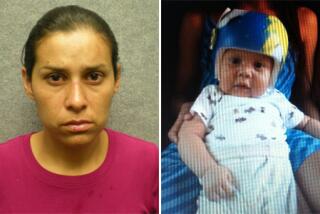Justices to Review Murder Case of Mother With ‘Baby Blues’
- Share via
SAN FRANCISCO — The state Supreme Court agreed Thursday to review a challenge to a controversial ruling that allowed a mother who claimed she suffered from “postpartum psychosis” to escape a murder conviction for driving over her child with the family car.
In a brief order, the court said it would consider an appeal by Orange County prosecutors to a trial judge’s decision to acquit Sheryl Lynn Massip, a 26-year-old Anaheim woman whom a jury had found guilty of second-degree murder in the death of her 6-week-old son Michael in April, 1987.
The Massip case was one of four the justices voted unanimously to review on the issue of whether a judge may reduce murder charges to voluntary manslaughter on grounds the defendant lacked malice because of mental illness.
The case had drawn widespread attention as one of the first attempts in the nation by an accused woman to contest murder charges on the grounds she was suffering from an extreme form of depression--commonly known as “baby blues”--that caused her to commit the crime.
The rare disorder has been found to cause severe anxiety, delusions and other effects among new mothers. Massip claimed she had heard voices telling her that Michael was in pain and to put him out of his misery. She then placed placed the child under a tire, drove over him and put the body in a trash can.
At the trial, Massip pleaded not guilty by reason of insanity, but a jury found her sane and convicted her of second-degree murder. Massip then asked for a retrial. But in a ruling that shocked attorneys on both sides, Superior Court Judge Robert R. Fitzgerald reduced the verdict to voluntary manslaughter and also found Massip not guilty by reason of insanity.
Maurice L. Evans, Orange County chief assistant district attorney, welcomed Thursday’s action, saying he was “very, very pleased” the court agreed to review the issue.
Bryant K. Calloway of Santa Ana, an attorney for Massip, expressed hope that the justices would uphold the trial judge’s action. “Justice was truly done in this case,” Calloway said. “The judge’s ruling was legally and morally correct.”
More to Read
Sign up for Essential California
The most important California stories and recommendations in your inbox every morning.
You may occasionally receive promotional content from the Los Angeles Times.












